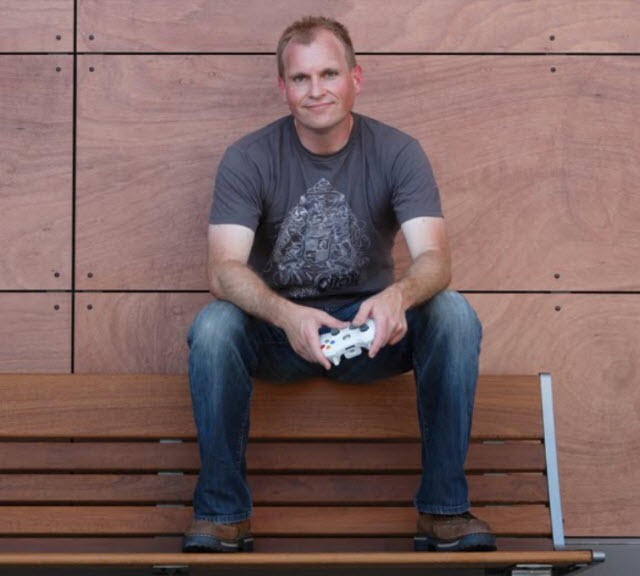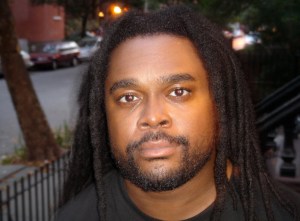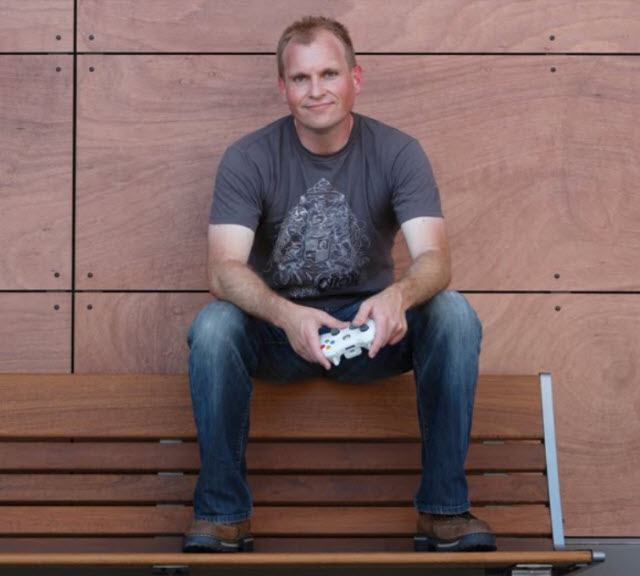
Hit Detection is one of those consultancies that has a hidden influence on video games. And if some of the games coming out these days don’t suck as much as they otherwise might, you can thank these guys.
N’Gai Croal (pictured right) was a noted video game critic who left Newsweek in 2009 to become an advisor for game developers. He started Hit Detection in order to offer his insights on gaming to developers — before they were too far down the road with their game designs to make changes. In an age when video games costs hundreds of millions of dollars to make, getting an early heads-up on what’s right or wrong with a game from a critic’s view is worth a lot.
 And today, Croal is bringing on another consultant, Andre Vrignaud (pictured at top), a former game industry professional who will provide insights about industry platforms, game technology, and games themselves.
And today, Croal is bringing on another consultant, Andre Vrignaud (pictured at top), a former game industry professional who will provide insights about industry platforms, game technology, and games themselves.
Together, they’re building a brain trust that should help game creators make better games and navigate the changing platforms in the years ahead. They’re not only consulting on games, but on consumer technology in general.
Croal, of course, can’t take credit for changing games that are fully created by large teams of game developers at traditional console game studios. But this says something: His team has grown to five people — including consultants Justin Blankenship and Anibal Arocho — and contracts with a bunch of specialists who are brought in as needed to evaluate works in progress. If his services weren’t valuable, he wouldn’t have this entourage of folks around him. And of the top 10 game publishers of 2011, five were clients of Hit Detection. Of the top 20 publishers, seven were clients.
Now Croal and Vrignaud get to be insiders who see all of the cool games before anyone else knows about them across multiple companies. That’s not a bad gig. The only trouble is, they can’t tell everybody about the games they’re checking out.
Vrignaud has worked in key technology positions at Intel, Microsoft, and Amazon.com. He spent eight years at Microsoft as director of technical strategy at Xbox, where he was involved in everything from Xbox Live to Live Arcade to Xbox 360 and Kinect. He will serve as chief consultant at Hit Detection. In his last job working with Kindle, Vrignaud felt he was getting a little too far from his passion for games. (He was also fighting a big war with his cable modem provider, Comcast; here’s the latest on that).
“I was thinking I need to get back to this and talked to N’gai about it,” he said. “I spent most of my career working for certain companies propagating their world view. At Intel, it was PC-centric. At Microsoft, it was Xbox. But I always had to stay attuned to the competition. I started thinking about working with game publishers more directly, knowing that services were becoming more important.”
There is a lot more for game creators to think about these days, like services such as Call of Duty Elite or mobile gaming.
“What a console will be is going to be hugely different in the next generation,” Vrignaud said. “The game device is being subsumed into other devices, and this may be the last one with explicit, discrete devices. The interface you use to interact with the device will matter a lot, and the services on top of it will matter the most.”
Consultants aren’t totally new to games. A number of game journalists such as Tom Russo and Blake Fischer have gone into the game industry. Game developers could use more honest feedback. Post-mortems always come at the end of a game project and they’re good for generating best practices for the next title, Croal said, but they come too late for the current game in the market or in production. Game critics, who can be brutally honest and more objective than internal reviews, provide that honest feedback. But it’s also too late to save a game that isn’t going in the right direction.
“We worked with clients at the concept phase,” Croal said. “They may be mapping out their game play, story, and prototypes and are moving into their first playable prototype. ”
At first, some developers were hesitant to share anything with an outside consultant. Even after Newsweek, Croal used to write a column for Edge magazine (that ended last year), but he didn’t write about games he was working on and made general observations about the industry. So some folks weren’t sure if he could be trusted to keep secrets. But over time, that changed.
“People are showing us some games from beginning to end, and that includes one that is more than a year away from publication,” Croal said.
Croal thinks that game reviewers have gotten tougher than they used to be in criticizing games. He notes how Epic Games’ Gears of Wars 2 had an average rating of 93 out of 100 on Metacritic, a game review aggregator, even though it had a lot of server problems. Gears of War 3 was arguably better, with multiplayer that worked, cooperative play that was more extensive, and other pluses. But it was rated an average of 91 on Metacritic.
“Everybody wants their game to be rated 90 or more on Metacritic,” Croal said. “If we come in early enough, and they have the right ingredients, it’s possible. But critics are getting tougher on games. So developers are fighting a game of inches, like in football. Any edge they can get, they will take it. They are hungry for feedback.”
Croal said that his team saw a major game in the works during an early stage. After evaluating the game, Hit Detection recommended that the developer pare back and focus. The game makers were creating a single-player campaign, cooperative play, and a multiplayer aspect.
“Even though the marketing perspective was that you need all three of those things to make a successful game, we said that, given where the developer was in their history, they should just focus on two of them,” Croal said. “The path to success was with two modes, not three. We did bang the game loudly on that.”
Croal also gives advice on storytelling, like whether it engages players emotionally or whether it drags on so long that they get bored with it. In one major game, Croal’s team suggested they move one part of a game to another part. The team now handles 12 to 15 engagements like this per quarter.
“We operate in the shadows,” Croal said. “Other people deserve their names on the box and in the media. Hopefully, at the end of it, you will see us riding off into the sunset and some kid will ask who was that masked man. They will never know, but they’ll be playing a fantastic game.”


